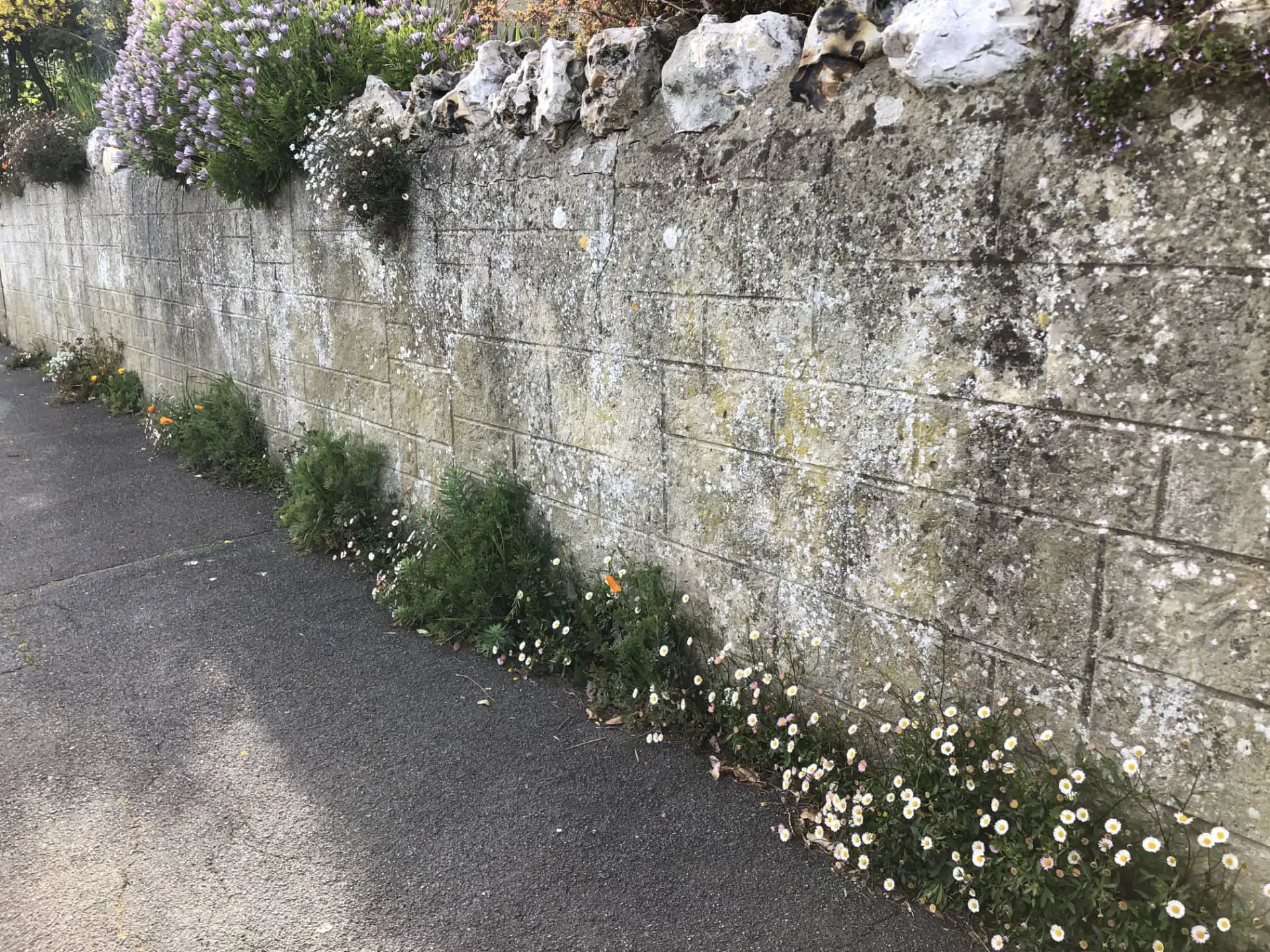News OnTheWight has been seeking to get to the bottom of whether Glyphosate – the controversial weed killer that is banned in several countries, but used by Island Roads – is actually written into the PFI Highways Contract or not.
Ventnor Town Councillor, Mark Jefferies, who launched an online petition calling for a ban on the use of Glyphosate on the Isle of Wight (4,300+ signatures), recently shared with News OnTheWight the response he received to an FOI request to Isle of Wight council about the use of Glyphosate.
He was told that, “the PFI Contract does not specify that Glyphosate has to be used”.
However, News OnTheWight has discovered that this information is incorrect.
Inaccurate FOI information
As it had been said during at least two Isle of Wight council (IWC) meetings that the use of Glyphosate is written into the contract, News OnTheWight set about to find out more.
After some persistent digging, News OnTheWight was informed by Cllr Phil Jordan, the Cabinet member responsible, that Glyphosate is written into the Method Statement (see below) of the PFI Contract, and that “the Method Statement is part of the Contract and part of the Contract obligations”.
Therefore Glyphosate is written into the PFI Contract. The FOI response was incorrect.
What is glyphosate used for?
Island Roads use a weed killer called Gallup Hi-Aktiv, which contains Glyphosate. It is marketed as the “strongest weed killer” on the market and powerful enough to kill Japanese Knotweed.
In 2018, an American jury found that Roundup, Monsanto’s glyphosate-based weed killer, “substantially” contributed to the terminal illness of a groundsman using the product.
When the contractual issue was first raised
During the February Full Council meeting, in response to a question about Island Roads returning to the use of Glyphosate-based weed killer, Cllr Phil Jordan, the Cabinet member for Transport and Infrastructure, explained the issue was a contractual one, “not an ecological debate”.
“As much as I’d like to be able to confirm we would take that binary decision not to use weed killer, the PFI contract calls for its use.
“To change that would require a waiver or deed of variation of the contract that would need both parties to agree to.”
Jordan: Use of weed killer is embedded through Performance Standards
In the last few days, Cllr Jordan has told News OnTheWight,
“The PFI refers to ‘Herbicides and pesticides’ and use of weed killer is embedded through Performance Standards, as laid out across the contract Method Statement, which (includes reference to Glyphosate) and refers also to Outputs.
“The Output would call for the Highways Network to be ‘free from vegetation’.
“To do so and achieve the Output the use of herbicides, pesticides, weed killer is demonstrably the only method currently possible – as also indicated by well over 300 of the 333 UK Local Authorities that use such products and unsuccessful trials of ‘alternatives’ on the Island and elsewhere in the UK.”
The Method Statement
He also shared this segment from the PFI Contract’s Method Statement, which clearly states Glyphosate be used for weed control.
MATERIALS
7.5 Few materials will be used for the Service Provider’s routine maintenance operations. While the Service Provider will maintain a corporate list of suppliers, it will source routine items locally when suitable and available.7.5.5 Materials identified for use on this Contract are:
– Glyphosate for weed control on hard surfaces and soft landscape features.
– Fertilizers for grass swards and shrub and rose areas (until the Service Provider’s own compost initiatives are providing sufficient material)
– Amenity grade bark mulch for mulching of shrub beds, again until the Service Provider’s own chippings are able to be used
In summary, although the IWC have expressed a desire for a more sympathetic approach, the PFI Contract requires Glyphosate to be used for weed control. Penalties will be issued to the contractor, Island Roads, if vegetation is not cleared.
Jefferies: Intend to complain
News OnTheWight asked Mark Jefferies what he view was on hearing the news.
“It seems to be a case of the left hand not knowing what the right is doing. An FOI request should be accurate and true. At the end of any FOI request it states if you have any complaint in respect of your request, please write to corporate information unit IWC. Something I intend to do.”
Jordan: Keeping a close eye on things
Cllr Jordan, went on to tell News OnTheWight,
“We will be keeping a close eye on an improved delivery system in the future and expect Island Roads to keep to our informal (at this stage) discussions and agreements.”
Glyphosate and the Ventnor wall lizard
Island Roads operatives have begun once again riding quad bikes spraying the weed killer as they speed along the pavements, as explained by this reader last week.
Back in 2019, Ventnor resident Steve Jones explained,
“About ten days ago I found another dead wall lizard at the base of a wall with desiccated plants, hours after Island Roads had once again been along with their herbicide sprayers.
“In previous years I’ve found moribund (not quite dead, suggesting sub-lethal effects) wall lizards under similar circumstances. Several wall lizard populations have died out (e.g. at the Alpine/Gills Cliff junction) since spraying started.
“I’ve alerted Island Roads and the MP to the issue, but still the spraying continues.”
Will Wall lizards really be protected from spraying?
Jump forward to 2022 and an Island Roads Q&A ‘fact sheet’ (embedded at the bottom of the article for your convenience), states:
“Whilst it is not considered that glyphosate would be harmful to lizards at the dilution levels used in public spaces, weed spraying is not used to treat vegetation on or next to the walls or other features that lizards populate.
“Manual methods are adopted to deal with these areas as they fall within a different area of maintenance requirements.”
Which roads are not sprayed?
Roads that we’re aware of in Ventnor that are populated by the wall lizards have in recent years been sprayed by the operatives on quad bikes, so News OnTheWight asked Island Roads last week for details of which roads they intend to avoid spraying in. An Island Roads spokesperson told us today,
“We do not have a list of roads in the Ventnor area that we do not spray, instead our delivery approach to weed management applies across the entire Ventnor area due to the potential for wall lizard populations.
“In Ventnor, we spray along the kerb line adjacent to the road but not at the back of the pavement where it abuts any walls. The same is true of areas where there is no pavement i.e. where the edge of the road butts directly up to a wall – again these areas are not sprayed to avoid the spray coming into direct contact with the wall.
“This work has been carried out recently and has now been completed until the next application in June.”
Spraying at the “back of the pavement where it abuts any walls” is something we have witnessed over many years in Ventnor, but Island Roads told us they have been working to the policy outlined above in Ventnor since 2017.
Strength of public feeling
Mark Jefferies’ petition has attracted over 4,300 signatures, demonstrating the strength of public opinion over the use of Glyphosate-based weed killers.
Recently Ventnor Town Council have written to Island Roads and IWC asking for a total ban, as well as banning its use on their own land.
Not meeting the contractual agreement
Following a number of complaints about the use of Glyphosate in previous years, in 2021 Island Roads announced they would stop using the weed killer and instead rely on traditional methods of removing weeds through the use of hand tools.
Island Roads say the number of complaints about weeds on roads and footways then increased dramatically. The company claim they had 221 complaints about weeds in 2021, compared to 47 in 2020 and 14 in 2019.
Not only that, but by not clearing the roads and footways of weeds, they were also at risk of failing to meet the PFI’s contractual agreements and facing penalties.
The alternatives
Last week News OnTheWight contacted Island Roads to ask what alternatives they tried and details of why they failed. This afternoon, an Island Roads spokesperson said,
“We trialled two non-glyphosate-based herbicide products at the beginning of 2021, however these herbicides killed the weed leaf but not the root and therefore the weeds quickly grew back.
“We then trialled a manual approach to weed removal through 2021 using additional teams and while more effective than the non-glyphosate-based herbicides, it still did not work as effectively as the glyphosate-based products.
“These licensed, diluted products kill both the leaf and the root reducing overall weed growth.”
Why Island Roads use Glyphosate
The factsheet below issued by Island Roads explains how and why they use a Glyphosate-based weed killer. News OnTheWight asked what level of dilution was used and for the source in relation to the claims of safety.
An Island Roads spokesperson said,
“The content of our frequently asked question sheet has largely been extracted from information publicly available from official sources that provide advice on the product. An example of this is the Health and Safety Executive advice that can be found here: Issues associated with the use of the herbicide (weedkiller) … (hse.gov.uk)
“The FAQS sheet has also been reviewed by the manufacturer/supplier of the product used to ensure it is technically correct.
“The product is diluted with water prior to spraying resulting in a mixture that is 2 per cent active ingredient with 98 per cent water.”
European bans
In 2020 Luxembourg was the first European Union country to completely ban products containing glyphosate.
In the same year, France announced a partial ban of the use of glyphosate products.
Germany are also working to employ a total ban of glyphosate products by the end of 2023.
Article edit
7pm 20th Apr 2022 – Comment from Mark Jefferies added





